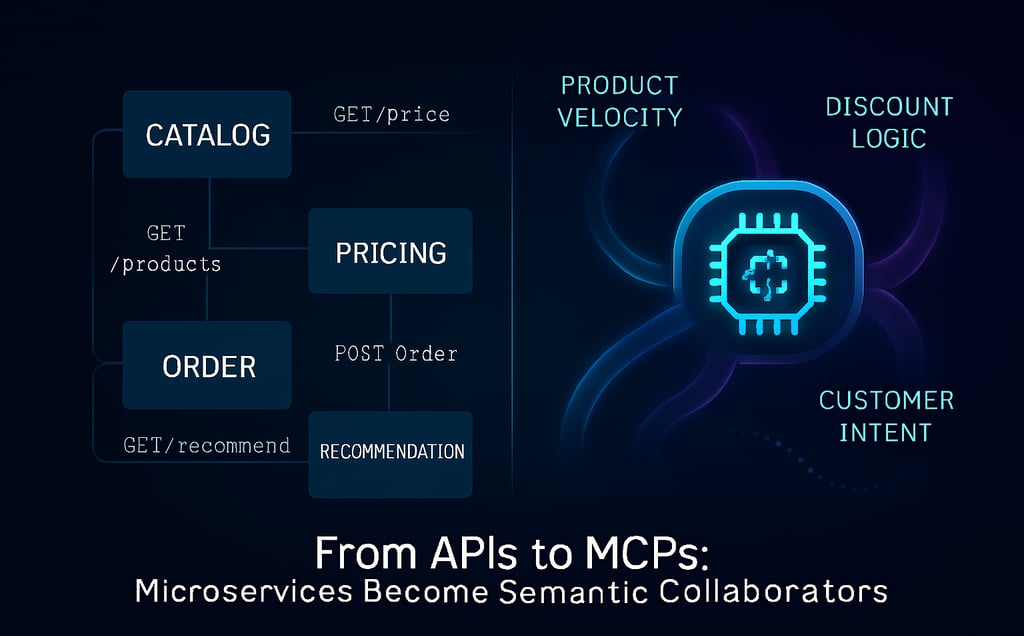Microservice's Reincarnation: From APIs to MCPs making E-Commerce Microservices Agent-Ready
Discover how Model Context Protocols (MCPs) are transforming e-commerce microservices into intelligent, agent-ready systems. This thought-leadership blog explores the limitations of traditional APIs, introduces MCPs as semantic wrappers, and showcases real-world use cases in retail—from flash sale orchestration to personalized recommendations. Learn how MCPs enable semantic interoperability, agent autonomy, and scalable intelligence—ushering in a new era of cognitive commerce.
AGENTIC AIMODEL-CONTEXT-PROTOCOLTHOUGHT LEADERSHIPLLMS
Kirti Jainani, Pankaj Jainani
8/25/20254 min read


E-commerce today is powered by a constellation of microservices—each a specialist in its domain. Product catalogs manage inventory, pricing engines adjust discounts, order services track fulfillment and recommendation engines learn what sells. These services form the digital backbone of modern-day retail services.
With the advent of AI agents, its impact has begun to shape the future of commerce, the way these services communicate must evolve. These microservices APIs, while they are fully implementing functional domain but has their limitations. They return data but not meaning as they only expose endpoints, but not any associated context.
To thrive in an agentic world, microservices must become more than data providers. They must become semantic collaborators.
Model Context Protocols (MCPs) brings in a new layer of abstraction that allows services to expose themselves in ways AI agents can understand, reason with, and act upon. MCPs don’t replace APIs; they enrich them. They expose schemas, share metadata, offer access to the domain specific data and contextual insight.
This context from MCPs enable evolution of e-commerce platforms for a future where agents don’t just consume data—they orchestrate decisions. Microservices are evolving and their existing APIs are reincarnated for MCPs, this promises generational shift for e-commerce which will be built up on this semantic foundation.
APIs Lack Semantics
Microservices speak in endpoints, and it responds with data. But they don’t explain what that data means. An API might return a product list, but it won’t say which products are trending also, it won’t say why a discount was applied and what a customer prefers.
APIs are built for systems and not for intelligence. They can only serve requests by exposing the functions and not their meaning.
In an agentic world, this causes the limitations as agents need semantics and context, as they emphasize more on "why" and "what if"—not just "what." This lack of context creates friction as AI agents struggle to reason and can’t infer intent.
To unlock intelligence, we must go beyond APIs and must enable services to describe their relevance and existence through context.
Introducing MCPs
Microservices need a semantic layer, and the Model Context Protocols (MCPs) offer that layer. They don’t replace APIs, but it enriches them by exposing their schemas, metadata, domain data, events and states. It helps to contextualize the domain logic.
MCPs gives interpretable abilities to the microservice. This enables agents to ask better questions, enriches their reasoning and business workflows orchestration capabilities.
MCPs turn microservices into collaborators as it enables semantic interoperability and unlock an agent’s autonomy by scaling its intelligence. With MCPs as a layer on top of abstracted microservices it’s not just a technical enhancement but a strategic shift towards agentic leap.
How MCPs can empower Retail Ecommerce services
Assume that there is a flash sale is, and inventory must be checked accordingly discount’s must be applied, henceforth, orders must be fulfilled. This distributed transactional workflow requires static state workflow orchestration. Each service executes its transaction in silos and shares the update of its state to the next downstream service.
With MCPs, services speak in context which enables catalog service to share product taxonomy and trending velocity. Pricing service explains discount logic and promotional triggers, and order reveals delivery friction and customer urgency.
With this contextual information an AI agent orchestrates the sale workflow ‘dynamically’, it is empowered to select high-velocity products and apply dynamic discounts thereby prioritizing urgent orders.
Agentic AI ensures that ecommerce retail becomes more adaptive to demand fluctuations by becoming more intelligent, by leveraging semantics from microservices having MCPs on its top.
Let’s again capture the underlying potential of MCPs on top of microservices, a customer returns to the platform and continue to browse from its previous linger & abandon session. With microservices having their APIs, catalog service will return product list. Customer behavior service returns clickstream, that enables recommendation engine returns suggestions. This is a traditional business transaction flow.
With Agentic workflows they need more context and meaning, catalog service must expose product taxonomy and must share affinity clusters to reveal co-purchase patterns.
Customer behavior service must explain session intent, along with dwell time, revisit signals and previous session abandonment reasons. Similarly, recommendation engine must expose similarity metrics with personalization weights.
MCPs enable this interaction by exposing behavioral semantics that describes customer’s journeys to share recommendation rationale.
AI agent empowered by MCPs adapts suggestions in real-time and nudge based on inferred intent it personalizes across services’ domains. Ultimately, we see an intelligent agentic workflow which is empowered by semantic understanding.
Why MCPs Matter
Semantic Interoperability
MCPs create a shared language across services as it exposes domain semantics, enabling agents to reason across boundaries thereby enabling microservices to no longer operate in silos empower them to collaborate through meaning.
Agent Autonomy
With MCPs, agents don’t just consume data, but they understand it by inferring intent, orchestrate decisions by adapting itself in real-time. MCPs empower agents to act independently, intelligently, and contextually.
Scalable Intelligence
MCPs scale cognition, being exposed to more context agents become smarter by acclimatizing with intelligence compounds across domains. This scalable evolves the system not through hard-coded rules but through business semantic growth.
Toward Agent-Ready Architectures
The future of retail ecommerce is not just digital but its cognitive. Business functional microservices must evolve from isolated endpoints to semantic collaborators. Agents must evolve from passive consumers to autonomous orchestrators. This transformation demands a new architecture one that is built on context, meaning, and intelligence.
Model Context Protocols are the foundation. They enable services to speak in semantics and empower agents to reason, adapt, and act. Agent-ready architectures are not just scalable but they’re interpretable, resilient, and future-proof.
This is not a trend, but this is a paradigm shift.
AInfoSci and the Path Forward
At AInfoSci, we build for cognition. Our services help microservices evolve with enhanced capabilities by enabling semantic interoperability. Our methodologies empower agent autonomy. We don’t just implement APIs along with it we design MCPs and don’t just deliver software but an intelligent architecture. Ecommerce is changing and agents are rising. AInfoSci is ready and let’s collaborate to build the future together.


